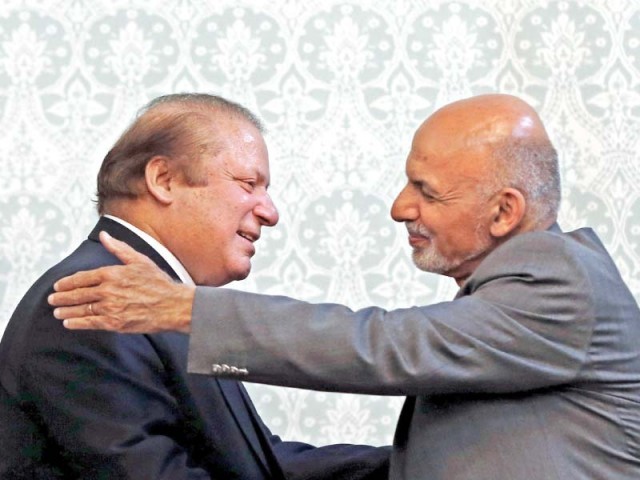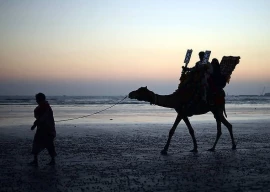
Kabul has time and again pressed Pakistan to allow India to become part of a proposed trilateral transit trade agreement between Pakistan, Afghanistan and Tajikistan. Pakistan, on its part, insists India will not be welcome to the trade arrangement until diplomatic ties improve between the two arch rivals.
Open Wagah or lose transit route, Ghani warns Pakistan
Pakistan has suggested that Delhi could join later after a thaw in the bilateral relationship, but it could not satisfy Afghanistan, which has hampered progress on the transit trade pact.
During his first visit to India in early May last year, Ghani had cautioned that if Pakistan did not open the Wagah land route for Afghan imports from India, he would not provide Pakistani trucks access to Central Asia. Now, he has made the same demand again.
Since the inking of $46-billion Pakistan-China Economic Corridor (CPEC) programme, tensions have heightened with eastern neighbour Afghanistan as well as India which is on the western periphery.
China has also won the right to operate Pakistan’s Gwadar Port, which gives it access to Gulf and Central Asian states.
The economic corridor could become a major success if it is stretched to Central Asia – a big market not only for China but also for Pakistan at a time when its exports have plunged by $4 billion.
Wagah open for Afghan traders: FO
Even Prime Minister Nawaz Sharif has issued directives for tapping markets of Central Asia in order to step up the country’s exports. Pakistan is looking at Central Asia as India wields considerable influence over member-states of the South Asian Association for Regional Cooperation (Saarc).
Delhi is using Kabul to put pressure on Pakistan to allow it to be part of the transit trade pact. Besides Afghanistan, India is also banking on Iran to reach Central Asia via land route. In this drive, it has also signed a deal for developing Iran’s Chabahar Port, which is considered a rival to the CPEC.
India is building the North-South Corridor through Chabahar Port, which will reach Afghanistan and eventually connect with Central Asia.
Four-nation accord
Commerce Minister Khurram Dastgir told the National Assembly Standing Committee on Commerce in February this year that in the face of slow progress by Kabul on the trilateral transit trade agreement, Pakistan wanted to revive its trade accord with China, Kyrgyzstan and Kazakhstan to reach markets of Central Asia.
The four-nation pact was signed in 1995, but it came into force in May 2004, allowing goods transport to Central Asia via China. This is an alternative route on which Pakistan and China are working since transit and bilateral trade with Kabul has been at a standstill. This has upset both Delhi and Kabul with warnings and allegations coming from the latter from time to time.
US role
In addition to trade in commodities, Pakistan is also pushing ahead with regional energy projects, including power and gas import from Central Asia, with Afghanistan being a part of them. However, in this case Pakistan has no alternative.
The stand-off between Kabul and Islamabad may hamper implementation of the two vital projects including Turkmenistan-Afghanistan-Pakistan-India gas pipeline and Central Asia South Asia (Casa) 1,000, which will bring electricity from Central Asia to Afghanistan and Pakistan.
The United States too is backing these projects as it is eager to connect Central Asian states with Afghanistan, Pakistan and India.
Some officials even suggest that Afghanistan is piling on the pressure on Pakistan for including India in the transit trade agreement with US backing.
Ghani may call truce with Hizb-i-Islami on Eid
However, Pakistan has had a love-hate relationship over decades with the US, which is now openly supporting India. Washington is cooperating with Delhi in civil nuclear technology and has recently signed a logistics agreement. It has also supported India’s bid to become a member of the exclusive Nuclear Suppliers Group.
After the CPEC, Pakistan has also become part of the cold war going on between the US and China in this region. Some diplomats of Central Asian nations posted in Pakistan believe Afghanistan will eventually suffer if it spoils its trade ties with Pakistan at the behest of India.
Already, Pakistan has kicked off work on an alternative transit trade deal for accessing Central Asia through China and it will definitely be feasible keeping in view the fast progress on the CPEC.
The writer is a staff correspondent
Published in The Express Tribune, September 12th, 2016.
Like Business on Facebook, follow @TribuneBiz on Twitter to stay informed and join in the conversation.





































COMMENTS (28)
Comments are moderated and generally will be posted if they are on-topic and not abusive.
For more information, please see our Comments FAQ